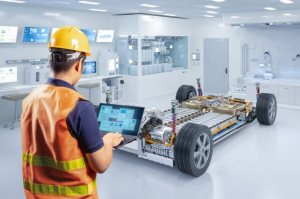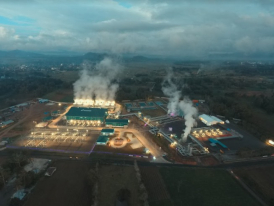PLN accelerates energy transition through media roundtable, startup collaborations
State power utility PT PLN on Tuesday, December 10, 2024 opened a Media Roundtable with four leading startups to accelerate the development of the green energy ecosystem.
The four startups, namely Maka Motors, Dayagreen, Gree, and 360E, are members of the Connext Powered by PLN program.
Darmawan Prasodjo, President Director of PLN, said that along with the increasing global attention to climate change, Indonesia is committed to accelerating the transition to a green energy ecosystem.
The growth of this green energy ecosystem is marked by the rapid growth of the electric vehicle (EV) industry, which is a major pillar in efforts to transition to more environmentally friendly energy.
"This EV trend is in line with the Indonesian government's policy of achieving energy self-sufficiency by utilizing abundant new and renewable energy sources (EBT) in the country. The hope is that the development of a green ecosystem can help Indonesia achieve Net Zero Emissions (NZE) in 2060," Darmawan said on Monday, December 16, 2024.
Abdan Hanif Satria, Executive Vice President (EVP) for Corporate Business Development and Investment of PLN said that this media roundtable aims to share insights on the development of the EV industry and technological innovation.
This strategic step provides space for startups to grow while supporting broader green energy initiatives.
"PLN not only acts as a facilitator, but also a leader in accelerating the development of electric vehicle technology and renewable energy. By collaborating with innovative startups, we want to ensure that the green energy ecosystem in Indonesia continues to grow with progressive and sustainable solutions," Satria said.
Challenges in EV
Ririn Rachmawardini, EVP for Commercial Product Development of PLN said that one of the main challenges in developing electric vehicles is ensuring that supporting infrastructure is adequately available, and PLN will continue to take proactive steps in responding to this challenge.
"As of December 2024, the number of Public Electric Vehicle Charging Stations (SPKLU) in Indonesia has reached 2,667 units and is projected to continue to grow until the end of this year. In an effort to accelerate the development of the electric vehicle ecosystem in Indonesia, PLN is ready to target an additional 1,100 SPKLUs in 2025," he said.
PLN has also prepared an EV Digital Services (EVDS) service integrated into PLN Mobile to provide convenience to EV users in one hand.
Opportunities and collaborations
PLN is very open to collaboration with various parties in the development of SPKLU infrastructure in all regions of Indonesia so that it can accelerate the growth of the electric vehicle ecosystem as a whole.
Raditya Wibowo, CEO of Maka Motors said that collaboration with PLN provides space for startups to develop while supporting broader green energy initiatives. Such as helping startups create electric vehicle products that are not only energy efficient, but also have superior performance.
"We believe that collaboration with PLN is a strategic key in accelerating the adoption of electric vehicles in Indonesia. This support gives us the space to focus on developing efficient technology that is in line with local market needs," he said.
Irwan Sukma, Chief Operating Officer of 360E explained that green distributed power generation has great potential to provide green energy to remote areas that are difficult to reach by conventional electricity networks. This technology will be an important element in creating an inclusive and equitable green energy ecosystem.
"Green distributed power generation is an important solution for an equitable energy transition. Collaboration with PLN opens up great opportunities to provide renewable energy-based solutions that can be implemented in various regions of Indonesia," Irwan said.
Already have an account? Sign In
-
Start reading
Freemium
-
Monthly Subscription
30% OFF$26.03
$37.19/MonthCancel anytime
This offer is open to all new subscribers!
Subscribe now -
Yearly Subscription
33% OFF$228.13
$340.5/YearCancel anytime
This offer is open to all new subscribers!
Subscribe now






